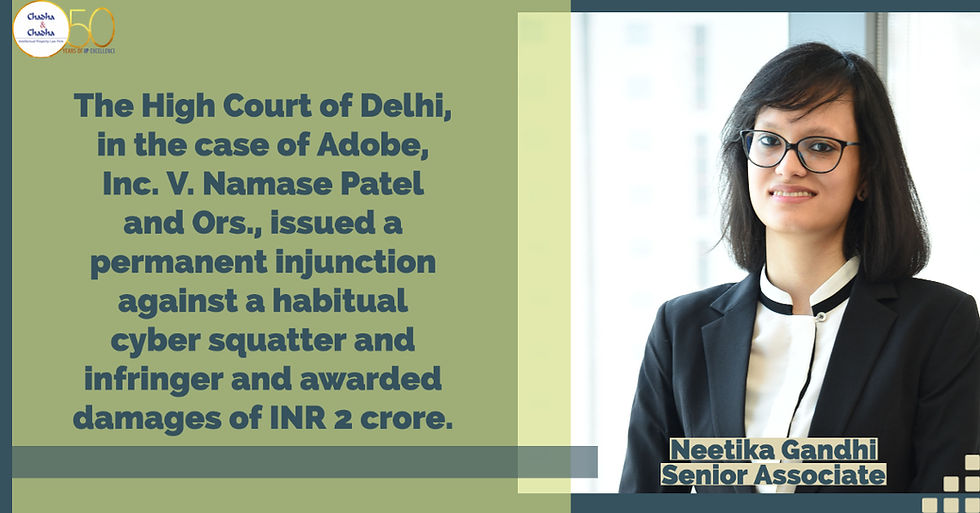High Court Awards Damages of INR 2 crore Against Habitual Cyber Squatter
- Neetika Gandhi

- Dec 5, 2022
- 3 min read

Introduction
The Hon’ble High Court of Delhi in the case of Adobe, Inc. V. Namase Patel and Ors.[1] issued a permanent injunction against a habitual cyber squatter and infringer permanently restraining it from registering any domain names comprising Adobe’s registered trade marks “ADOBE”, “PHOTOSHOP” and “SPARK”. The Court also awarded damages to Adobe amounting to INR 2,00,01,000/- (approx. USD 2,44,294.80) to act as a deterrent for the Defendant.
Background
The present suit was instituted by Adobe, Inc (hereinafter the “Plaintiff”) against Namase Patel and Others (hereinafter the “Defendant No. 1 and others”) alleging infringement of its mark “ADOBE” by Defendant No. 1 via his domain names www.addobe.com and www.adobee.com (hereinafter the impugned domain names).
The Plaintiff also alleged the infringement of its marks “PHOTOSHOP” and “SPARK” as the Defendant No.1 was also using several sub-domain names within the impugned domain names which included the Plaintiff’s marks “PHOTOSHOP” and “SPARK”.
Further, the Defendant No. 1 was also using the catch-all services provided by Above.com, through which if any sender misspelled the second part of the intended email, to be sent to the Plaintiff, i.e., after “@” to @addobe.com or @adobee.com, instead of the email bouncing back it was delivered to the Defendant No.1’s inbox. Thus, the Defendant No. 1 by employing this service could also access the confidential information of the Plaintiff.
To support its assertions, the Plaintiff placed on record the affidavit of its Director, IP & Marketing and Assistant Secretary which stated that the forensic investigation revealed that the impugned domain names were configured with the Plaintiff’s ADOBE branded products “PHOTOSHOP” and “SPARK” and also that the Defendant No.1 employed the catch-all service provided by Above.com.
The Plaintiff also placed on record orders passed by the National Arbitration Forum and the WIPO Arbitration and Mediation Center against the Defendant No. 1 which revealed that the Defendant No. 1 was habitually involved in cybersquatting and infringing the domain names of several well-known brands such as Under Armour, Hartford, Dior, etc.
Thus, it was the Plaintiff’s case that owing to the confusing similarity between the impugned domain names and the Plaintiff’s mark “ADOBE”, the Defendant infringed the Plaintiff’s mark and was also passing off his services as those of the Plaintiff.
Findings of the Court
The Court in light of the various orders passed against the Defendant No. 1, opined that, “Defendant No. 1 is an inveterate cyber squatter, whose main sphere of activities involves infringing well-known domain names by using deceptively similar domain names and thereafter indulging in further misuse and infringing activities.”
While upholding the rights of the Plaintiff in its well-known mark “ADOBE”, the Court passed the following directions:
● Issued a permanent injunction restraining Defendant No. 1 as well as its employees, servants, agents, representatives and other associated with him from registering any domain names which incorporate or otherwise use the Plaintiff’s mark “ADOBE”, “PHOTOSHOP” and “SPARK” in a manner which would infringe the Plaintiff’s registered marks or would otherwise infringe the marks;
● Directed the telecom service providers to block the impugned domain names immediately;
● Directed the domain name registrar to transfer the impugned domain names to the Plaintiff;
● Issued a permanent injunction restraining Defendant No. 1 from disclosing any confidential information received by him related to the Plaintiff;
● The Plaintiff was awarded a quantum of INR 2,00,01,000/- (approx. USD 2,44,294.80) claimed in the suit. These damages were intended to be deterrent in nature given the nature of activities of Defendant No. 1 and the fact that he stands recognized, even in foreign jurisdictions, as being an inveterate and habitual cyber-squatter and domain name infringer.
Conclusion
Orders affirming extraordinary damages play an integral role in protecting the IP ecosystem, specifically against habitual offenders. In the present case, the fact that the Defendant was not only infringing upon the rights of the present Plaintiff, but several other well-known brands suggests that courts must follow a unique deterrence approach such as that in the present case to tackle such offenders.
[1] CS(COMM) 159/2022
































Comments